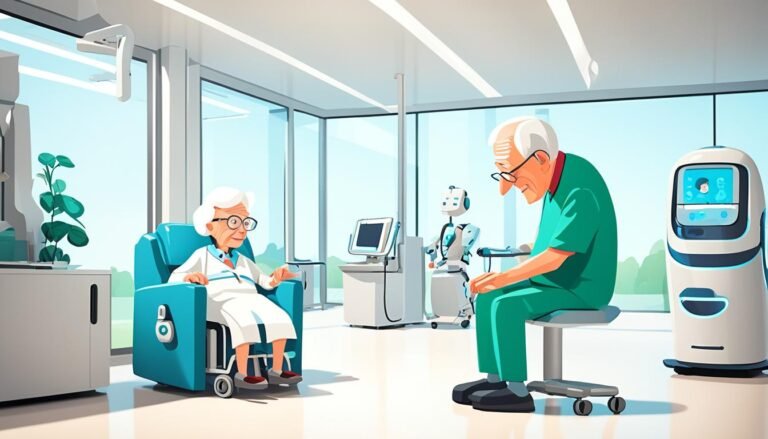Artificial Intelligence in Irish Healthcare: Benefits and Challenges
Did you know AI can review and translate mammograms 30 times faster with 99% accuracy? This shows AI’s huge potential in healthcare. It’s changing the game in Ireland, making early disease detection and improving service delivery.
But, these new tech advances come with challenges. Issues like transparency, public trust, and rules need to be sorted out.
The Irish Platform for Patients’ Organizations, Science & Industry (IPPOSI) is tackling these challenges. They’ve set up a Citizens’ Jury to give advice on using AI in healthcare. This shows Ireland’s dedication to using AI in a fair and ethical way.
Derick Mitchell, CEO of IPPOSI, says the benefits of AI in healthcare are huge. But, we must deal with issues like biased algorithms and keeping patients safe. Ireland is working to make sure AI technology is used wisely, with strong ethical rules and public input.
Key Takeaways
- AI in Irish healthcare brings exceptional speed and accuracy in diagnostics, crucial for early detection and treatment.
- Key initiatives like the IPPOSI Citizens’ Jury highlight Ireland’s proactive approach to ethical AI implementation.
- AI can significantly cut down time and costs in drug research and discovery, streamlining healthcare innovation.
- Health data combined with AI supports clinical decisions and helps prioritize administrative tasks.
- Robust frameworks are essential for addressing concerns related to algorithm bias and patient safety.
- Public trust and transparency are critical in the widespread adoption of AI in healthcare technology innovation.
- AI has the potential to fill gaps in healthcare workforce shortages, enhancing service delivery.
Introduction to AI in Irish Healthcare
Artificial Intelligence is changing healthcare in Ireland in big ways. It’s set to improve reading medical scans, make treatments more personal, and help manage waitlists. AI can look at huge amounts of data, which means better healthcare services.
This could lead to better disease detection and diagnosis. It will shape the future of healthcare policies in Ireland.
AI is making a big difference in healthcare. 86% of organizations see how important it is to match AI plans with their goals. 95% of companies think it’s key to keep checking these plans to stay ahead.
In Ireland, AI in healthcare is showing good results. For example, Mater Misericordiae University Hospital in Dublin looked at over 15,600 patient scans with AI. They found more than 700 health issues in just minutes.
Also, the University of Galway got funding to use AI for better blood pressure treatment. They want to fix big gaps in managing high blood pressure.
Ireland wants to lead in using AI responsibly. The public and private sectors are working together to follow laws like the GDPR. They aim for AI in healthcare to be innovative, ethical, and secure.
The Digital for Care – Digital Health Strategic Framework 2024-2030 outlines this vision. It sets the stage for detailed policy support before the Health Information Bill.
The AI advisory council, set up by the Department of Enterprise, Trade and Employment, met for the first time this year. Even though none of its members are doctors or healthcare experts, they bring skills to help AI grow in healthcare safely and ethically.
Global groups like the World Health Organization (WHO) are also helping. The WHO has new advice on the ethics and rules of AI in health. This advice includes over 40 recommendations to make sure AI helps health while following strict ethical rules. This is what Irish healthcare aims for with AI.
Overview of the Current AI Landscape in Ireland
The Irish AI landscape is seeing big steps forward and big plans. These aim to bring AI into many areas, like healthcare. Ireland has been working on AI for over 20 years. This has built a strong place for AI research and development.
Companies like OpenAI are now setting up shop in Ireland. This is because of the country’s AI know-how and its forward-thinking schools. For example, Ireland offers a top-level AI master’s degree. This shows Ireland’s dedication to making skilled AI experts for the future.
The government is also putting money into AI through the Enterprise Ireland Technology Gateway Programme. This has gotten €47 million ($50.2 million) for the next nine years. So far, over 4,500 companies and researchers have worked together, spending €60 million ($64.1 million). These partnerships are key for making new AI discoveries and keeping Ireland ahead in AI.
In healthcare, companies like ICON use AI to make clinical trials better. They use machine learning to find the right patients faster. This helps speed up the process of making new medicines.
More and more business leaders are putting money into AI because they see its big benefits. They think AI will make their businesses more productive. Ireland wants 75% of its companies to use AI by 2030. They’re getting there with big plans and a new AI Ambassador, Dr. Patricia Scanlon.
Ireland is also focusing on making AI ethical and joining global AI talks. With ongoing investments and learning, the Irish AI landscape is set to change healthcare for the better.
Key Benefits of AI in Healthcare
Artificial Intelligence (AI) is changing healthcare in big ways. It’s making patient care better and improving how things work. By using AI for diagnostics and personalized care, healthcare is moving forward fast.
AI Diagnostics and Early Detection
AI is great at finding diseases early. It cuts down on mistakes by 86%. This could save over 250,000 lives each year.
AI looks at images and spots patterns to catch diseases sooner. This is a big step forward from old ways.
AI-Powered Telemedicine
AI is making telemedicine better. It lets doctors check patients from far away and keep an eye on them. This helps people in hard-to-reach places get the care they need.
It makes healthcare more accessible and efficient. By 2026, it could save the healthcare system $150 billion.
Personalized Treatments and Patient Outcomes
AI is making healthcare more personal. It looks at each patient’s health data to find the best treatment. This leads to better health outcomes for patients.
It also means treatments work better and have fewer side effects. This is a big win for health management.
AI is changing healthcare in big ways. It’s not just about better treatments; it’s about making healthcare better overall. The market for AI in healthcare is expected to grow a lot, showing how big of an impact AI is having.
AI in Clinical Decision Support Systems
Clinical decision support systems with AI are changing healthcare. They offer tools for advanced predictive analytics. These tools help healthcare providers make better decisions by giving them insights.
AI is making patient care and healthcare operations more efficient. It’s a big change for the better.
Predictive Analytics Tools
Healthcare now uses predictive analytics tools to guess patient risks and outcomes more accurately. A 2019 study in the Future Healthcare Journal showed how these tools help predict health events. They help sort out risks in the patient population and manage care better.
Enhanced Decision-Making for Healthcare Providers
AI doesn’t just predict patient outcomes; it changes how healthcare professionals make decisions. A 2020 study in the Frontiers in Pharmacology journal showed AI’s impact on medical tasks. It makes healthcare tasks more efficient and accurate.
AI helps reduce healthcare workers’ workload and cuts down on errors. It’s a key tool in clinical decision support. This leads to better patient care and decisions.
Machine Learning Applications in Healthcare
Machine learning is changing healthcare by offering advanced tools for analyzing data and making predictions. In Ireland, machine learning healthcare projects are growing. They aim to improve patient care and make healthcare more efficient.
AI uses algorithms to look at electronic health records (EHRs) to predict when patients might need to be admitted and how to best treat them. For example, studies have shown that using data mining and machine learning can accurately predict disease outcomes. This was seen in a study on heart failure types (Austin, Tu, Ho, Levy, Lee, 2013).
AI is also great at spotting serious health issues early. For example, it can predict acute kidney injury in emergency rooms by looking at EHRs (Martinez, Levin, Klein, et al., 2020). Another example is the TREWScore, which helps spot septic shock early (Henry, Hager, Pronovost, Saria, 2015). This shows how machine learning can help in timely interventions.
Machine learning also helps predict when heart failure patients might be readmitted, helping doctors plan better (Jiang, Siddiqui, Barnes, et al., 2019). It’s also being used to manage hospital equipment better, helping track and use resources well (Martinez, Cai, Oke, et al., 2020).
But, there’s still a lot to learn about machine learning in healthcare. Only 56.6% of medical students know what ‘machine learning’ means (Allen, Mataraso, Siefkas, et al., 2020). We need to teach future doctors more about AI to help them use it well.
Using machine learning more in healthcare could greatly improve patient care and make things run smoother in Ireland. It’s a big step towards a healthcare system that relies on data.
Robotic Surgery Advancements
In recent years, robotic surgery technology has changed surgery in Ireland a lot. This technology, with the help of artificial intelligence, is making surgery more precise. It’s setting new standards in how surgeries are done.
Precision and Minimally Invasive Techniques
Robotic surgery is leading the way in innovation. It offers unmatched precision and minimally invasive methods. These methods have greatly improved patient outcomes. They have also reduced recovery times and lowered the risk of complications.
Studies by Stewart et al. (2019) and Liu et al. (2020) show big steps forward in robotic surgery. They focus on general surgical oncology and thyroid neoplasms. These studies highlight how robotic assistance leads to better accuracy and safety in tough surgeries.
Success Stories in Irish Hospitals
Irish hospitals have taken to robotic surgery technology, with great success. They’ve used AI to make complex operations easier and more efficient. During the COVID-19 pandemic, robotic-assisted surgery became more common. This showed its value in keeping care standards high even when things were tough.
Sheetz et al. (2020) found robotic surgery is now used in many common surgeries. This change has made healthcare better overall. Patients stay in the hospital less and recover faster, thanks to these advances.
The arrival of robotic surgery in Irish healthcare marks a big step forward. With AI and precision techniques leading the way, Irish hospitals are setting the bar high. They’re showing the world how to improve surgical outcomes.
Data Privacy Concerns in AI-Driven Healthcare
AI in healthcare offers big benefits but also raises big concerns about AI data privacy. Keeping patient information safe is crucial as healthcare uses more AI tools and devices. With new tech, the chance of data breaches and unauthorized access to patient info is higher. This calls for strong healthcare data security steps.
Wearable devices and online doctor visits collect and process patient data, like steps taken and heart rate. Laws often don’t fully cover this, making healthcare places responsible for keeping patient data protection up to standard. Automated processes, profiling, and sharing health data online add more complexity and risk.
Trying to anonymize data can be tricky. It’s meant to hide patient identities but might share sensitive info without consent. This creates tough ethical questions about ethical AI use. Making sure patients know how their data is handled is key as Ireland deals with AI in healthcare.
AI in healthcare is expected to grow a lot, with a 37.57% growth rate from 2023 to 2030. But, this growth needs strong healthcare data security steps. Creating a clear privacy plan is key to lowering privacy risks with patient data. Working together between doctors and AI makers is important to make sure AI is fair, accurate, and clear.
As AI changes how we diagnose, plan treatments, and predict outcomes, keeping patient data safe is a top goal. Finding a balance between tech progress and strong patient data protection will make sure new healthcare tech is both useful and right.
Ethical AI Frameworks in Ireland
In Ireland, the use of artificial intelligence in healthcare is very important. Groups like the Irish Platform for Patients’ Organizations, Science, and Industry (IPPOSI) are leading the way. They aim to make sure AI is used ethically by making decisions clear and open to everyone.
The Role of the IPPOSI Citizens’ Jury
The IPPOSI Citizens’ Jury is a key project that brings patients into the AI debate. It has a mix of people from all walks of life in Ireland. They talk about the good and bad of AI in healthcare. Their advice helps shape AI policies that put patients first and follow AI ethics standards.
Addressing Algorithm Bias
Algorithm bias is a big issue in AI healthcare. IPPOSI and others are working on fixing this. They want to make sure AI doesn’t unfairly treat anyone, ensuring everyone gets the same quality care.
Working together, schools and companies are improving these rules. Projects like Empower, supported by Science Foundation Ireland, are creating safe spaces for testing AI. They follow European rules to make sure AI in healthcare is used right.
These efforts show Ireland’s dedication to using AI responsibly. They make sure Ireland’s AI work is not just new but also right and good for everyone.
Challenges of Implementing AI in Irish Healthcare
Adding artificial intelligence to healthcare is complex. The benefits are big, but there are also big challenges. We must focus on a strong legal setup for AI and building trust by being open about healthcare.
Regulatory and Legal Considerations
It’s crucial to tackle the legal and regulatory hurdles for AI in healthcare. We need laws that keep up with AI’s fast pace, focusing on safety and ethics. This means careful checks and clear rules to avoid legal problems.
Working with regulators and being open about healthcare is key to overcoming AI challenges.
Public Trust and Transparency
Getting people to trust AI in healthcare is essential. Patients and the public must understand what AI can and cannot do. Being open about how AI works, how data is used, and its benefits to patients is important.
Without trust, AI in healthcare might not be accepted. Being clear about AI can help keep the public informed and confident.
Case Studies: AI in Irish Healthcare Institutions
AI in Irish healthcare has shown great results, with many case studies. These studies show how AI can improve patient care and make medical work easier.
At St. James’s Hospital in Dublin, AI helps with early disease detection. By using machine learning, they can spot issues in patient records quickly. This means patients get diagnosed faster and treated sooner.
Beaumont Hospital in Dublin uses AI for telemedicine to help remote areas. This means patients in far-off places can get expert care without leaving home. It’s a big step towards making healthcare more accessible everywhere.
In Cork University Hospital, AI helps make treatment plans just for each patient. By analyzing complex data, they can predict how different treatments will work for each person. This leads to better treatments and happier patients.
At the Mater Misericordiae University Hospital, AI helps surgeons with robotic surgery. This new way of surgery is less invasive and helps patients recover faster. It shows how AI can change complex surgeries for the better.
These examples from Ireland show the big wins AI brings to healthcare. Ireland is leading the way in using AI in healthcare. This shows how AI can make medical services more innovative, efficient, and effective. It’s all about improving patient care and results.
Future Prospects for AI in Irish Healthcare
Ireland is moving forward with its healthcare, focusing on AI as a key tool. The Irish national AI strategy aims to improve health outcomes and make healthcare more efficient. It puts a big emphasis on ethical AI to guide the future of healthcare.
National AI Strategy for Ireland
The Irish AI strategy is all about testing and validation. Dr. Conor Judge, a consultant nephrologist, says big clinical trials are key for AI in healthcare. The University of Galway has set up a new Institute for Clinical Trials to improve patient care with AI.
Projects like Dr. Judge’s research on AI for hypertension show Ireland’s commitment to AI in healthcare. AI tools like the Brainomix 360 stroke platform are changing patient care in Irish hospitals. They make medical imaging and stroke management better.
Collaborations and Industry Investments
Strong AI industry partnerships are crucial for the future of AI in healthcare. The MedMatch Network is a great example. It uses AI to make patient care better, engage patients more, and cut down on paperwork for doctors.
Generative AI, like Chat GPT, is important for analyzing patient data to give doctors better advice. This helps make diagnoses more accurate and treatment plans better. Plus, it keeps patient data safe with HIPAA rules.
Ireland is preparing for an AI-powered healthcare future. With ongoing investments and ethical use of AI, healthcare will become more efficient and focused on patients.
Conclusion
Artificial intelligence is changing Irish healthcare in big ways. It’s making patient care better and making things run smoother. Studies in top journals like JAMA and Lancet show AI helps with diagnosis and making treatments fit each patient. But, there are also worries about privacy and ethics.
In Ireland, finding the right balance between AI’s benefits and privacy concerns is key. The goal is to use new tech while keeping the public’s trust. Groups like NHSX and the AI Lab in NHS England offer advice on using AI in healthcare the right way.
The future of healthcare tech in Ireland looks bright, thanks to more partnerships and investments in AI. Ireland is working hard to make sure AI helps patients without causing problems. By focusing on patient care and using tech wisely, Ireland is set for a healthier future.
Source Links
- No longer science fiction, AI and robotics are transforming healthcare
- Artificial intelligence in healthcare: transforming the practice of medicine
- Healthcare 2 – AI Ireland
- The continuing AI revolution – Medical Independent
- How Ireland connects AI and life sciences
- AI Startups in 2023: A Comprehensive Overview
- AI in Healthcare: How Is It Revolutionizing This Critical Industry?
- How AI is Transforming Healthcare: A Comprehensive Guide
- What Are The Benefits and Importance of AI in Healthcare?
- A Systematic Review of the Barriers to the Implementation of Artificial Intelligence in Healthcare
- The promise of artificial intelligence: a review of the opportunities and challenges of artificial intelligence in healthcare
- Transformative Potential of AI in Healthcare: Definitions, Applications, and Navigating the Ethical Landscape and Public Perspectives
- Machine learning and artificial intelligence: applications in healthcare epidemiology | Antimicrobial Stewardship & Healthcare Epidemiology | Cambridge Core
- Machine learning in medical education: a survey of the experiences and opinions of medical students in Ireland
- Embracing robotic surgery in low- and middle-income countries: Potential benefits, challenges, and scope in the future
- The IDEAL framework for surgical robotics: development, comparative evaluation and long-term monitoring – Nature Medicine
- Artificial Intelligence & Privacy Challenges with AI-Powered Medical Devices
- The Challenges of Artificial Intelligence in Healthcare – Simq
- Collaborative Research Addresses Safe and Responsible Use of AI in European Healthcare
- Ireland’s Artificial Intelligence hub
- Implementing AI In The Healthcare Industry: Benefits & Challenges – Optimal Virtual Employee
- Artificial Intelligence (AI) Research in Ireland
- Challenges of using artificial intelligence
- AI and Risk Management in Ireland | Deloitte Ireland
- Advantages and disadvantages of artificial intelligence in healthcare
- How AI is already being used in Irish hospitals – and what the future might hold for patient care
- Introducing the Future of Healthcare Access: Generative AI as a Patient Engagement Tool
- Artificial intelligence for healthcare and medical education: a systematic review
- Realising the benefits of artificial intelligence for nursing practice | Nursing Times








